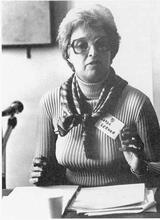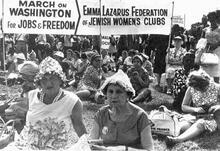Eve Merriam
Eve Merriam mingled poetry for children with devastating social criticism for adults, introducing a new generation to the power of poetry to create change. A lifelong feminist, Merriam criticized the women’s fashion industry, wrote biographies of major historical and current political figures, and infused progressive social commentary into her many plays and poems. Much of her poetry was aimed at sparking a love of language in children, but writings like Inner City Mother Goose highlighted urban blight with an incisive accuracy, igniting controversy and garnering critical acclaim.
I’ve sometimes spent weeks looking for precisely the right word. It’s like having a tiny marble in your pocket, you can just feel it. Poetry is great fun. That’s what I’d like to stress ...: the joy of the sound of language.
The tactility and fertility of language, its joys and journeys, are the stuff of Eve Merriam’s more than fifty books of poems for children. “Eat a poem,” she urged her readers and listeners (for her, poetry was to be “out loud”). “Don’t be polite. / Bite in. / Pick it up with your fingers and lick the juice that may run down your chin.”
Influences and Education
Eve Merriam was born Eva Moskowitz in Philadelphia, on July 19, 1916, one of four children of Jennie (Siegel) and Max Moskowitz, emigrants as children from Russia. The family owned a chain of dress shops, and Eve “grew up with fashion.” Her book Figleaf: The Business of Being in Fashion (1960) is a wittily devastating critique of the industry for its manipulation of women.
After graduating from the University of Pennsylvania in 1937, she embarked on graduate study at Columbia University. There, a teacher speculated that her lack of success in getting her work published might be the result of her Jewish surname. She chose the writing name Merriam from the Merriam-Webster Dictionary on her desk. Although she delighted in travel and loved the sea, Merriam’s life and writing career centered on New York. Married four times, she was the mother of two sons, Guy (b. 1951) and Dee (b. 1952), by her second husband, Martin Michel. She raised her children in the city and once commented, “I expect to be the last living inhabitant of Manhattan when everyone else has quit for sub or exurbia.”
Poetry, Plays, and More
Though known for her books of children’s poetry, there is more to Merriam’s remarkable body of work. For children and adults she wrote biographies of women and men whom she saw as models: Franklin D. Roosevelt (1952), Emma Lazarus (1956, 1959), and Martin Luther King, Jr. (1971). She transformed a lifelong commitment to progressive political views into poems and plays of urban life and social justice. In The Inner City Mother Goose (1969), she transforms nursery rhymes into social commentary. “Hushabye Baby” is not on the treetop but on “the top floor / Project elevator / Won’t work any more,” and “Mary, Mary / Urban Mary,” watches her “sidewalk grow / with chewing gum wads / And cigarette butts.” Set to music by Helen Miller, Inner City: A Street Cantata opened on Broadway in December 1971.
The Club (1976), a wry and sharply comic satire of male behavior, epitomizes the feminism that had been a motif in Merriam’s work long before the contemporary women’s movement. In 1951, she and historian Gerda Lerner wrote a revue, “Singing of Women,” for the women’s division of the New York Council of the Arts, Sciences, and Professions; the poetry collection The Double Bed from the Feminine Side appeared in 1958; one of the first books for children about women’s work, Mommies at Work, came in 1961; and After Nora Slammed the Door (1964) carried the subtitle American Women in the 1960’s, the Unfinished Revolution. A self-descriptive list in Merriam’s papers notes, “She claims to have been born a feminist, since her birth date is July 19th, the anniversary of the [Seneca Falls convention] in 1848.”
Legacy
Eve Merriam died on April 11, 1992, in New York City. She was, above all, a poet: “You write poems because you must ... because you can’t live your life without writing them.” A posthumously published volume, Embracing the Dark (1995), concludes with the “Poems Purgatorio” sequence in which the love of language and poetry struggles with the fact of dying: “It may well be exquisite, as the dictionary notes, / adj. keen, intense, acute.”
Selected Works
BOOKS
After Nora Slammed the Door (1964)
The Double Bed from the Feminine Side (1958)
Embracing the Dark (1995)
Emma Lazarus, Woman with a Torch (1956)
Figleaf: The Business of Being in Fashion (1960)
I Am a Man: Ode to Martin Luther King, Jr. (1971)
The Inner City Mother Goose (1969)
Mommies at Work (1961)
The Real Book About Franklin D. Roosevelt (1952)
The Story of Ben Franklin (1965)
The Voice of Liberty: The Story of Emma Lazarus (1959).
PLAYS
The Club (1976)
Inner City: A Street Cantata (1971)
Singing of Women, with Gerda Lerner (1951).
American Women Writers. Vol. 5, supplement (1995)
Merriam, Eve. Papers. Kerlan Collection, University of Minnesota at Minneapolis–St. Paul, and Schlesinger Library, Radcliffe College, Cambridge, Mass.




